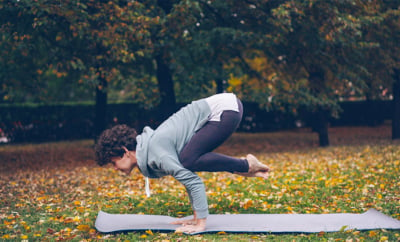This Is Your Brain on Gratitude: 9 Benefits of Practicing Gratitude

We’ve all heard the seemingly endless positive effects of practicing gratitude for our physical and emotional bodies. If you were to listen to some of the claims out there, this state of mind has the power to influence all aspects of life from your sleep to your anxiety levels.
Supposedly practicing gratitude even has the ability to reduce physical pain. Whenever I hear this, I imagine gratitude turning us into superheroes.
And, it turns out, these claims do have some ground to stand on. Let’s take a look at the science of gratitude and how we can apply it in our daily lives.
The Science of Gratitude – Here Are 5 Ways That Practicing Gratitude Impacts Our Brain Activity:
The most concrete scientific evidence we can find on how practicing gratitude can create actual change in our bodies and our lives can be found in our brain activity. These are measurable differences in the activity and chemical output of our neurological system.
Here are impressive and observable things that happen in our brain when we feel grateful:
1. Changes Grey Matter Volume
There are neurochemical differences at the central nervous system that can reflect how grateful we can feel. People who express and feel gratitude have a higher volume of grey matter in the right inferior temporal gyrus.
That’s pretty amazing.
2. Activates Different Brain Sites
Studies have shown that hippocampus and amygdala, the two main sites regulating emotions, memory, and bodily functioning, get activated with feelings of gratitude.
These areas are involved in feelings of reward, morality, interpersonal bonding and positive social interactions, and emotional intelligence.
3. Increases Neurochemical Production
Practicing gratitude not only activates certain important parts of the brain, it also has the capacity to increase important neurochemicals, namely dopamine and serotonin – the two most well-known neurotransmitters responsible for our warm and fuzzies.
These chemicals help to manage negative emotions like guilt, shame, and violence and ultimately contribute to feelings like closeness, connection, and happiness that come with gratitude.
4. Reduces Pain Symptoms
One study entitled “Counting Blessings Versus Burdens” conducted on evaluating the effect of gratitude on physical well-being, indicated that 16 percent of the patients who kept a gratitude journal reported reduced pain symptoms by regulating the level of dopamine.
Practicing gratitude fills us with more vitality (prana), reducing subjective feelings of pain.
This Simple Yet Life-Altering Exercise Will Help You Find Gratitude Every Day
5. Improves Well-Being
Leading gratitude researcher Dr. Emmons revealed in his book titled The Psychology of Gratitude that gratitude practices impacts an impressive range of mind/body aspects.
Gratitude improves the sleep-wake cycle and enhances mood. It helps people with insomnia, substance abuse, and eating disorders and can reduce cardiac diseases, inflammations, and neurodegeneration significantly.
The Science of Gratitude and Psychology – Here Are 4 Ways Practicing Gratitude Can Improve Psychological Health:
In addition to our neurochemical management, there have been many studies on how practicing gratitude can effectively change the way we think! Not just chemical reactions but actually rewiring the way we process information and consciously react.
1. Creates New Neural Pathways
Humans have this very useful survival technique that basically requires us to look for all the possible doomsday scenarios and opportunities for danger.
This is called a negativity bias and when we do this repeatedly, eventually our brains automatically default to this negative response. (*Ahem* Samskaras.)
Repeatedly feeling grateful for just 20 seconds gives space for the positive experience to expand, or for us to “re-experience” it, rather than just immediately shifting back to our look-out-for-scary-things-mode.
On other words, practicing gratitude creates and strengthens a new neural pathway. Now we have a new, positive automatic brain response that can override our habitual negativity bias.
Want to learn more? Read: How Samskaras Change Your Brain
2. Helps to Manage Phobias
This ability to shift away from negativity and toward positivity means that gratitude practices are especially effective for managing phobias like death anxiety, PTSD, social phobia, grief, and nihilism.
Can Gratitude Help You Heal After Losing a Loved One? A Survivor’s Journey Through Grief
3. Potentially Changes Our Outlook on Life
In theory, by consciously practicing gratitude everyday, we can help these neural pathways to strengthen themselves and ultimately create a lasting grateful and positive nature within ourselves.
4. Positively Supplements Counseling
There are a few different studies that consider the effect of gratitude writing, specifically. These studies show that practicing gratitude on top of receiving psychological counseling carries greater benefits than counseling alone, even when that gratitude practice is brief.
These studies also showed that the positive effects of gratitude writing stuck around even three months later.
Here Are Our Top 5 Gratitude Journal Recommendations For a Happier Life
Put It Into Practice – Here’s Your Step-by-Step Guide to Practicing Gratitude:
Let’s Try It:
- Find a comfortable, peaceful place to sit with your pen and paper. Close your eyes and take a few breaths in stillness
- When you open your eyes, spend five to 10 minutes writing down a few things that you feel grateful for right in this moment. It can be something as simple as your comfortable place to sit
- For every item, pause for 20 seconds or so, letting yourself feel grateful
- At the end of the exercise, reflect on what you felt
- Practice every day for a week and notice if your gratitude list grows or changes!
Take It One Step Further With This Gratitude Meditation
Establish a solid gratitude practice with this powerful guided gratitude meditation on YA Classes.
The Science of Gratitude Really Does Support Practicing Gratitude Regularly
From neurochemicals, to psychological neural pathways, and even to pain management, gratitude is not just a new age trend.
There are proven studies that show how immensely powerful the act of gratitude can be on our body as a system and more studies are proving this every year.
Are you a gratitude superhero? What changes have you noticed since starting your gratitude practice? Have any tips? Please let us know in the comments below – we love hearing from you!


This Month's Letter
From the Editor
Monthly motivation and food for
thought from our founder.

























